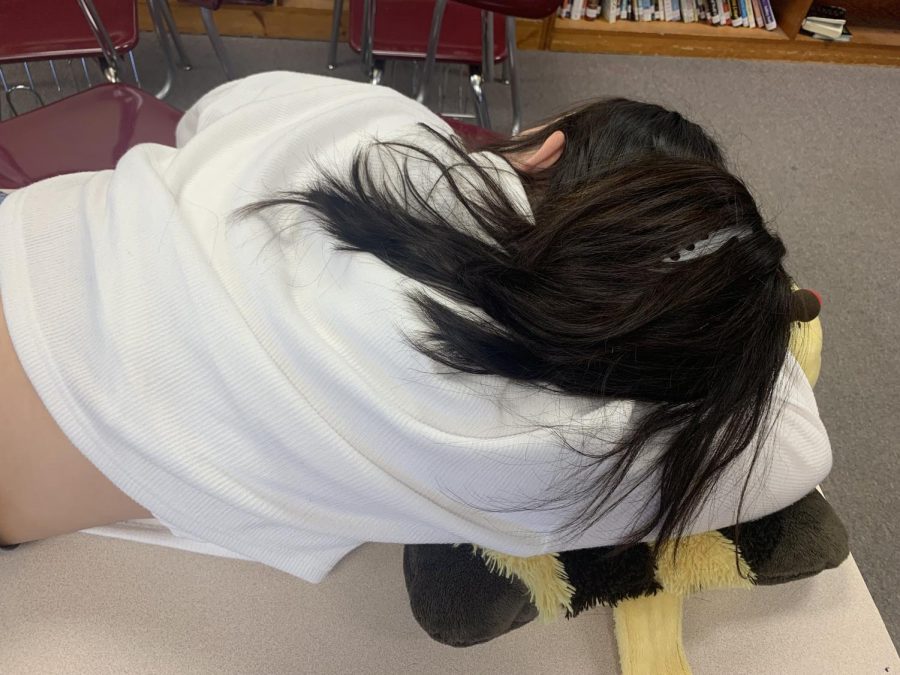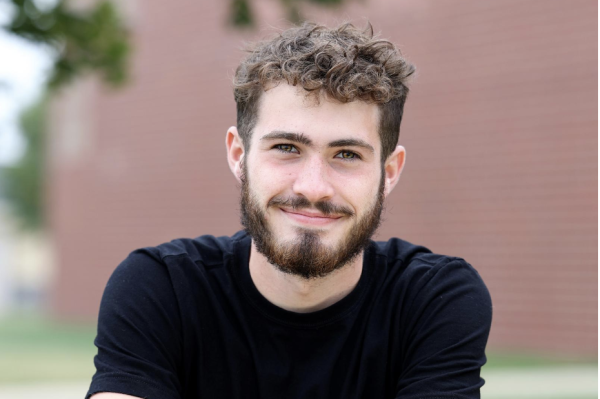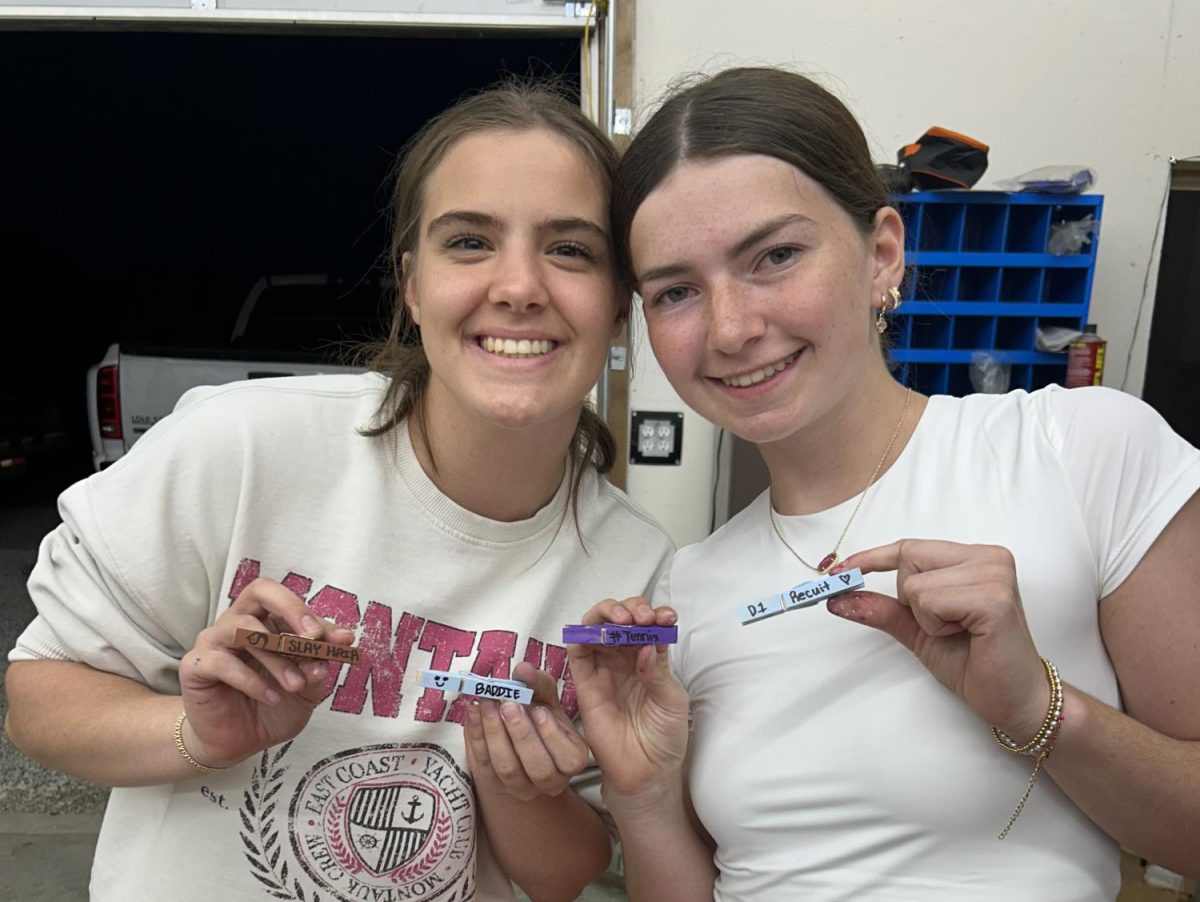Hitting Snooze on Bad Sleep Schedules
Many AHS students and teachers don’t get the sleep they need for optimal school performance.
AHS student Eleanor Greving snuggles with a pillow pet in Journalism class.
April 5, 2022
Set the scene: After staying up way too late doing homework, you wake up feeling exhausted. You know you didn’t get enough sleep, but that’s starting to be a normal thing. Thinking you’ll be fine with some caffeine, you stop by Scooters and get a coffee on your way to school. However, the coffee isn’t enough to keep you going and you pass out in class. When you wake up in the middle of a Spanish lesson thinking you’re in a different country, you realize that you probably should’ve gotten some more sleep.
You wouldn’t be the only one that isn’t getting enough shut-eye sleep, as almost half of AHS students and teachers replied to a form and reported not getting enough sleep. This lack of sleep at AHS is a problem many don’t realize, but it needs to be noticed more. Sleep deprivation is a serious, yet overlooked issue, nationally and locally, and it’s plaguing many very silently.
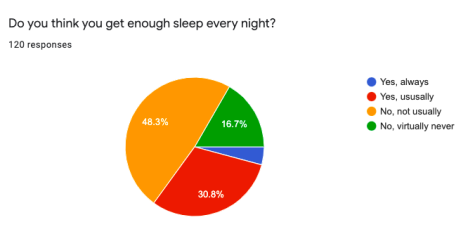
Sleep is an essential part of life. Along with other necessities like eating, drinking, and going to the bathroom, sleep should be a top priority for people. Nearly one-third of your life is spent sleeping, and for good reason. Sleep naturally prevents sickness and stress, can increase productivity, and in general boosts your mood. It also, obviously, prevents tiredness. However, according to the CDC’s research on American students’ sleeping habits, nearly seventy-three percent of high schoolers don’t get enough sleep.
The recommended amount of sleep for a teenager is eight to ten hours, but the average amount of sleep for AHS is five to seven hours. It may not seem like a huge difference, but missing sleep adds up very quickly. Putting aside time to make up sleep is the only way to make up sleep, but some people just can’t find that time.
While this is an extremely common problem, there isn’t one solid answer to fixing it. There ar
e general tips that can help such as changing nightly routines, rearranging schedules, or removing time-absorbing activities from your life. However, these solutions might not work for everyone.

Many at AHS participate in sports and other activities that can take away sleep, but sacrificing these activities to get more sleep is a hard thing to do. One student said, “I could participate in fewer activities so I can get my homework done earlier, but I enjoy all of my activities.”
Another response was, “I love those things so I wouldn’t give them up.” Some people prioritize their passions oversleep, and changing this aspect of themselves may not be an option.
One thing that many students would like to change, though, is homework. Forty-eight percent of AHS say that homework is a reason for losing sleep. However, homework is a given in school and can’t be avoided. Everyone has to do homework and sometimes it may be overwhelming for students. Stressing over homework is a stressor that many students don’t need, as they already lack free time after school because of work, chores, or sports.
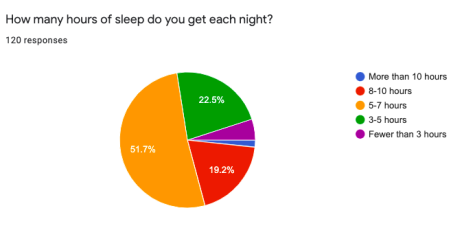
When faced with sleep deprivation in students, students themselves don’t really acknowledge this problem. Teachers, though, do notice this problem. Cole Renken is the Health and PE teacher at AHS and deals with this lack of sleep first-hand. “I ask the question in my classes all the time and I’ll have kids say they didn’t sleep the night before. It kind of surprised me the number of students that don’t sleep well.” When students don’t get enough sleep, teachers can see the signs in class. “You see students with their elbow on the desk, head down, and their concentration levels are just a little bit lower because of that lack of sleep they got before.”
Unlike some students, Renken prioritizes getting enough sleep. He usually gets just over eight hours each night and understands how important sleep is. “I can tell on nights when I had trouble falling asleep, the next day I’m just not as motivated or interested in teaching.”
Renken knows what keeps him from sleeping and tries to avoid these things. “If the room’s too warm at night, if I eat too close to the bed, or if I have a stressor in my life that I’m overthinking, that can keep me up at night.” The problem is, though, that students may not stay away from the things that keep them from sleeping. They may realize that they’re on their phone too late or stay up doing homework past their normal bedtime, but they don’t go out of their way to fix these problems.
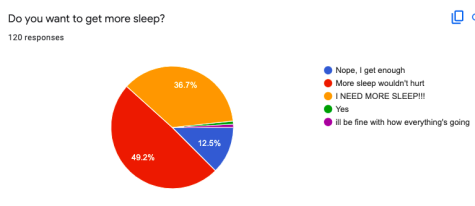
To fix your sleep schedule, “You have to find that routine that best fits you.” Renken recommends sticking to a schedule that works for you and keeping it consistent. Staying away from stressors before going to sleep can be beneficial for getting enough sleep. “Whatever routine best fits for each person are what they have to figure out.”
Instead of having to worry about falling asleep in class, worrying about going to sleep is a positive change that more people should do. Getting enough sleep to skip going to scooters every morning will save you a few dollars every morning, and it can save your grades too!

